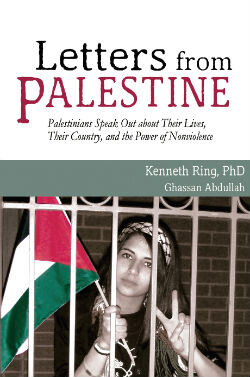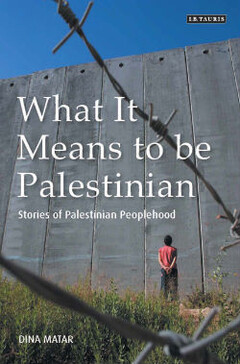The Electronic Intifada 14 December 2010

Ring explains in the introduction that his interest in the plight of the Palestinian people is relatively recent. The book takes the form of a selection of letters to Ring from Palestinian correspondents, many of whom he was put in touch with by his co-editor Ghassan Abdullah, who himself writes one of the best, and most humorous, chapters of the book. Most of the pieces were written especially for this volume, but others were originally sent out as emails or blog posts addressed to American friends. There are even two poems, including the transcendent and brilliant “Pick Me Up” by Hind Shoufani.
There is a decent selection of the Palestinian experience in all its variety represented in the book; all contributors are Palestinians from the diaspora, from the West Bank and from Gaza — plus one account of contemporary Palestinian life in Haifa. The international scope of the Palestinian reality is well conveyed. Unfortunately omitted for the most part, is the particular plight of refugees in the camps in Arab states (although there is a good selection of stories from West Bank and Gaza refugees). The subjective and personal nature of most of the pieces also means the work as a whole suffers a little from lack of context and detail at times.
The kind of subjects that constitute “everyday life” for Palestinians varies greatly, even within this selection. But some common themes do emerge: personal and collective identity; return and dispersal from the homeland; racism, freedom and family life are some of the most identifiable. The final part of the book brings things up-to-date with tales from the most recent major Israeli assault on the population of Gaza in winter 2008-09.
The book could have benefitted from more professional editing. In places the editors have stayed too pedantically faithful to the drafts as written by their authors. Staying true to each author’s vernacular is an admirable goal, but the practice here is sometimes rather too over-literal, even to the point of not correcting the kind of simple grammatical errors commonly found in informal emails (even for those who have English as a first language).
But it would be churlish to dwell on such imperfections — this is an uplifting and important book. The variety of the contributions and their personal nature makes this a very accessible read for those who know little or nothing about the history of the Palestinians. It should move readers new to the topic to want to learn more, and helpfully there is a final section of recommendations for further learning: books, websites and documentaries.
Although there is little here that will be new to those familiar with the topic, personal Palestinian stories such as these always come with an emotional impact one never gets from reading dry charts and figures of massacres and forced displacements.
Take the story of Ziad Abbas, who recounts how he returned for a single day with his uncle to the remains of his original village in what is now Israel. They faced danger sneaking past Israeli checkpoints, but emotional questions from the past intrude on the experience. “You were eighteen years old when you left. Many people like you could have stayed and defended your land,” Ziad angrily tells his uncle, who laments that “No one supported us” (p. 145).
Or the story of Shaden Abu-Hijleh, shot dead by Israeli soldiers while sitting on her own porch sewing embroidery. Although there are many terrible and tragic stories like Shaden’s, there is also a genuine warmth and humor in the tales of everyday life here.
This is a book with a lot of heart. It is also a brilliant educational tool. In a more just world, it would come with an Oprah Book Club sticker on its cover. It would make a good present for a loved one. It serves as a great introduction to the Palestinian people, and more than makes up for its lack of historical detail with its sheer humanity.
Asa Winstanley is an independent journalist based in London who has lived in and reported from occupied Palestine. His website is www.winstanleys.org.
Related Links





